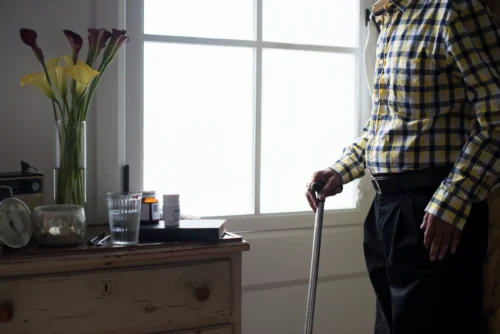Dementia and Incontinence: Easy Home Care Tips
Dementia and incontinence often come together as the condition progresses. When the brain changes, it can affect bladder and bowel control. This can feel upsetting and confusing, both for the person and the carer.
In this guide, we’ll explore why dementia and incontinence are linked. We’ll also share useful tips to make home care easier. With the right approach, it’s possible to keep your loved one clean, safe, and comfortable.
Understanding Dementia and Incontinence
Dementia is a brain condition that slowly damages memory, behaviour, and thinking. Over time, many people lose the ability to follow routines, including using the toilet.
Incontinence means a person cannot control when they pee or poo. This may cause small leaks or full accidents.
When dementia and incontinence happen together, daily care becomes more complex. Some people forget how to use the toilet. Others do not know they need to go or cannot reach it in time.
This can be frustrating, but help is available.
Why Dementia Causes Incontinence
Dementia affects each person differently. But many people begin to have toileting accidents due to these reasons:
- Memory Loss: They forget the feeling of needing to go.
- Confusion: They may not find the toilet or know how to use it.
- Slow Movement: They might not reach the toilet in time.
- Speech Trouble: They cannot ask for help when needed.
- Lost Routine: They no longer go at regular times.
As dementia gets worse, the person may stop recognising the need to use the toilet. That’s why early support is vital.
Types of Incontinence in Dementia
Knowing the type of incontinence helps carers give better support. Here are the most common types found in people with dementia:
1. Urge Incontinence
This causes a sudden, strong need to urinate. The person may leak before reaching the toilet.
Example: Rose feels the need to quickly and wet herself before she can stand up.
2. Functional Incontinence
The person knows they need the toilet, but can’t get there in time due to confusion or movement issues.
Example: Bill forgets the way to the toilet and has an accident near the door.
3. Overflow Incontinence
Here, the bladder does not empty fully. Small leaks happen often. This may occur with dementia, especially in older men.
Example: Frank goes to the toilet often but still has wet patches in his clothes.
Dementia Types and Incontinence

Each type of dementia affects the brain in a different way. This means how and when incontinence happens can vary. By understanding the differences, carers can give more targeted and sensitive help.
Alzheimer’s Disease and Incontinence
Alzheimer’s disease slowly affects memory and understanding. In the early stages, the person may still feel the need to use the toilet but might forget where it is or how to get there.
As the disease gets worse, they may not recognise the feeling of a full bladder or bowel at all. They might also struggle with basic steps like pulling clothes down or using toilet paper.
Example: Jean, who once kept a perfect routine, now walks past the toilet and forgets why she was heading there. She sometimes wets herself and gets confused when her clothes are wet.
Vascular Dementia and Incontinence
Vascular dementia is caused by reduced blood flow to the brain, often after strokes. It usually affects planning, decision-making, and movement.
This type of dementia can lead to physical weakness. The person may want to use the toilet but struggle to get up or walk fast enough. If a stroke affected the bladder nerves, they may also lose control suddenly.
Example: Jack had a mild stroke and now walks with a stick. Even though he knows when he needs to pee, it takes him too long to reach the bathroom, so accidents happen.
Lewy Body Dementia and Incontinence
This form affects both thinking and physical movement. People often have trouble walking, tremors, or sudden confusion. Their abilities may change from day to day—or even hour to hour.
They might do well one moment, then suddenly become stiff or sleepy. These unpredictable changes increase the risk of accidents.
Example: Rita is fine one day, helping herself to the toilet. The next day, she wakes up soaked and cannot explain what happened. Her sleep is broken, and her movements are slower.
Frontotemporal Dementia and Incontinence
FTD mostly affects the part of the brain that controls behaviour and judgement. This means people might not understand what is socially acceptable.
They may take off their clothes in public, urinate in the wrong place, or ignore the urge to go. This is not done on purpose—it’s because they can’t control their actions.
Example: Paul suddenly pulls down his trousers in the living room and pees into a plant pot. He doesn’t seem to notice that it’s wrong or unusual.
Simple Home Solutions for Dementia and Incontinence
Managing dementia and incontinence at home is possible with good planning and care. These tips will make life easier for everyone.

Set a Regular Toilet Routine
Take the person to the toilet every two hours, and before meals or bed. This builds a habit.
Example: Sam takes his wife before breakfast, after lunch, and again before bed.
Add Visual Signs
Use signs or pictures to guide them to the toilet. Bright arrows and clear images work well.
Example: Lucy adds a picture of a toilet on the door with a bold arrow.
Dress Them in Easy Clothing
Choose clothes that pull up or down easily. Avoid buttons, belts, or zippers.
Example: Max wears loose tracksuit bottoms he can manage on his own.
Use Incontinence Aids
Pads, mattress covers, and toilet seat handles help reduce mess and offer comfort.
Example: Joan uses pads during the day and bed pads at night to feel secure.
Supporting Health to Reduce Incontinence
Daily habits can make incontinence easier to manage. Try these health tips:
Monitor Drinks
Give water regularly, but limit drinks a few hours before bed. Avoid tea, coffee, and alcohol.
Example: Steve gives his dad warm water during the day and stops by 7 p.m.
Encourage Good Food
A fibre-rich diet helps avoid constipation, which can lead to leaks.
Example: Mary gives her mum whole grains, fruits, and soft-cooked vegetables.
Protect the Skin
Wipe gently after accidents and use soft creams. This prevents rashes and discomfort.
Example: Carla keeps wipes and cream in every bathroom for quick clean-ups.
Spot Early Signs of Incontinence in Dementia
Incontinence may not start all at once. Early signs include:
- Pulling at clothes
- Restlessness
- Pacing or fidgeting
- Wet patches or strong odours
Example: Greg notices his mum getting angry before wetting herself. He learns to guide her calmly to the bathroom.
Caring at Different Dementia Stages and Incontinence
Dementia and incontinence change over time. At each stage of the disease, the person’s needs grow. Being prepared at each step can make home care less stressful.
Early Stage Dementia
In early dementia, most people still know when they need to use the toilet. But they may forget where it is or how to get there. Anxiety, distractions, or confusion can also lead to accidents.
They might feel embarrassed and try to hide wet clothes or stay silent. This can cause skin infections or odours if unnoticed.
What helps:
- Gentle reminders like, “Would you like to use the toilet?”
- Signs on the bathroom door
- A routine, such as toilet visits before meals and bed
Example: Linda hangs a toilet sign with a picture on the bathroom door. Her dad now finds it easier and uses it on his own.
Middle Stage Dementia
As dementia progresses, the person may forget to go until it’s too late. They may also have trouble sitting on the toilet, removing clothes, or wiping properly.
They might become restless, angry, or anxious without knowing why. These are often signs they need to go. They may also deny they’ve had an accident, even when it’s obvious.
What helps:
- Taking them every 1–2 hours
- Using absorbent pants or pads
- Keeping a calm, respectful tone
- Giving clear, step-by-step help
Example: Ron takes his wife to the toilet every two hours and speaks gently, “Let’s go now before dinner.” She feels less embarrassed and stays dry more often.
Late Stage Dementia
In the late stage, the person may lose all bladder and bowel control. They may also lose awareness of wetness or smell. Accidents can happen during sleep or meals.
They might resist help or seem unaware they need it. Full care is needed, including help with dressing, washing, and managing hygiene. Skin care becomes crucial to prevent infections or sores.
What helps:
- A mix of night and day protection products
- Bed pads and mattress covers
- Wiping the skin gently after every change
- Using barrier cream to protect from rashes
- Speaking softly and kindly during care
Example: Karen checks her mum’s pad every few hours, even during the night. She softly says, “Time for a quick freshen-up,” and keeps her clean and relaxed.
Adapting Your Home for Dementia and Incontinence

Small home changes can help reduce accidents. Try these ideas:
- Install grab bars by the toilet
- Add soft night lights to guide the way
- Keep the doors open to the bathroom
- Remove loose rugs or clutter
Example: Elaine added rails and nightlights. Her father now reaches the toilet safely at night.
Why Home Is Better for Dementia and Incontinence Care
Home is often the best place to support someone with dementia and incontinence. Here’s why:
- Familiar Settings: They know the layout better.
- Flexible Routines: You can create a toilet schedule that works.
- Personal Care: Loved ones give better, kinder help.
- Fewer Disruptions: They feel calmer at home.
Also, carers can learn faster what works best. With fewer people involved, there’s less confusion and stress.
Incontinence Accidents – How to Stay Calm and Kind
Accidents are part of dementia and incontinence. Your calm response helps keep the person at ease.
- Speak softly and slowly
- Offer help without blame
- Never scold or shame them
Example: Instead of saying “You made a mess again,” say “Let’s go clean up together.”
This keeps their dignity intact and makes daily life smoother.
When to Speak to a Doctor
Sometimes incontinence has treatable causes. Call the GP if you notice:
- Sudden changes in toileting
- Pain when urinating
- Constipation
- Skin rashes or infections
Doctors can check for infections, side effects, or give better care tools.
Support for Carers
Looking after someone with dementia and incontinence is tough. You deserve help too.
- Ask friends or family for breaks
- Join a local carers’ group
- Book respite care when needed
Example: Nora meets other carers weekly. They share tips and support each other.
Taking care of yourself helps you care better for them.
Final Thoughts on Dementia and Incontinence
Dementia and incontinence are closely linked. As the brain changes, the body does too. Accidents become more common, but they don’t mean the end of comfort or dignity.
With the right tools and a caring approach, life at home can still feel safe. Focus on routines, clear signs, and kind support.
Every day will be different, but love and patience go a long way.
“Get trusted advice on dementia care at home and practical tips for caring for someone with dementia at home—all in one place.”

